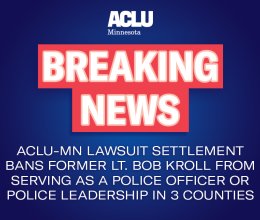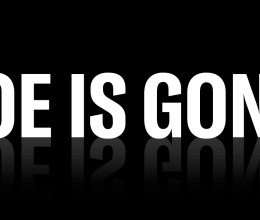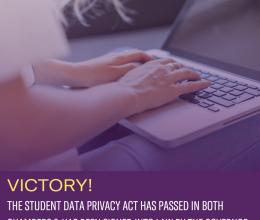"[Students do not] shed their constitutional rights to freedom of speech or expression at the schoolhouse gate.”-- Justice Abe Fortas, Tinker v. Des Moines, 1969
Tinker v. Des Moines was a groundbreaking case that first established student rights to free expression. As students around the country have been gearing up for a National Day of Protest on March 14, 2018, the ACLU has been hearing reports of school officials around the country threatening students with punishment for participating in the walkout. To prevent any such occurrences from happening in Minnesota, the ACLU of Minnesota sent the following information to all Minnesota superintendents.
The ACLU-MN also created a one-page guide for students on their rights to participate in protest or walkouts: Student Right to Protest/Walkout.
Dear Superintendent,
Over the past month, the Parkland, Florida, students who survived a mass shooting at their school on February 14th have been organizing a nationwide, 17-minute school walkout, scheduled to take place this Wednesday, March 14th. Students across the country and here in Minnesota have been inspired by their leadership and courage. Some students are learning for the first time that their voices matter and that by banding together they can affect public policy.
This, and other acts of peaceful student activism, present school administrators with rare, teachable moments in which students can learn a fundamental lesson in civics outside the classroom. As educators, you can take full advantage of this moment, and nurture your students’ efforts to learn for themselves about participatory democracy. In this way, you can help this generation of students to develop into active and responsible citizens.
Or you could choose to suppress this new wave of student activism and, in turn, reinforce an all-too prevalent cynicism among students that their voices don’t matter, and that individuals are powerless to impact government and society.
We encourage you to seize this moment and use the determination so evident in students to foster civic pride and responsibility. There are many ways that administrators and teachers can play this role, including the following:
- Interpret absentee policies liberally to allow students to attend demonstrations. Our laws and policies implicitly recognize that missing a day or two of class will not destroy a student’s education. Students are typically allowed to miss school for religious holidays, doctor’s appointments, and family events. Attending a demonstration should be viewed as an equally valid reason to miss school occasionally.
- Ensure that policies regarding on-campus speech allow ample room for public discussion. Students may wish to express their views while on school grounds in a variety of ways – from rallying at the flagpole before school, to distributing literature, to wearing t-shirts. While schools may regulate this speech to prevent disruption of education, they should remember that this sort of discussion is also educational, and tread lightly on student’s political expression.
- Foster discussion among students with different views. Students are highly motivated to find ways to prevent school shootings. But they will inevitably have different opinions about how best to do that. Teach students the skills to argue persuasively for their viewpoint, to listen respectfully to other views, and to be open to changing their minds. Demonstrate equal respect for students who choose to attend demonstrations and students who choose not to do so.
- Provide historical context. The current wave of student activism is part of a rich American tradition. Teaching students about the movements for the abolition of slavery, women’s suffrage, civil rights, and other causes will enhance students’ experiences and help to inform their decisions about how best to effect change in the world.
This is a unique moment in history, and a singular opportunity for many high school students. The attached memo includes some important legal principles for you and your students to consider. The lessons you teach your students now will be with them for life. We urge you to foster your students’ civic awakening, and help to ensure the health of our democracy in decades to come.
Sincerely,
The ACLU of Minnesota


